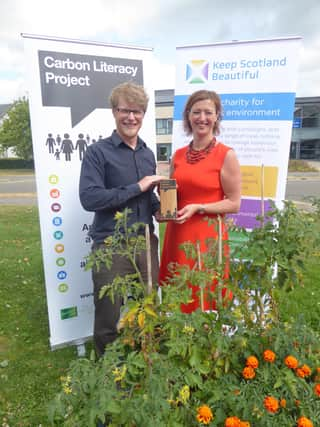We can all become ‘carbon literate’ - Catherine Gee


Climate change is impacting our lives now; we are seeing more frequent and more extreme weather events such as floods and record beating temperatures – 2020 once again set records globally for extreme heat.
Last month we welcomed Scotland’s Climate Change Plan update and draft Public Engagement Strategy. Yet we acknowledge much more needs to be done, and urgently, if we are to truly build a green recovery and catalyse action towards our net zero ambition.
Advertisement
Hide AdAdvertisement
Hide AdThe UK Committee on Climate Change analysis suggests that almost 60 per cet of the emissions abatement we need to see between now and 2035 will require at least some action on the part of the public.
We know that there is a real desire for further action from people in Scotland; with 79 per cent of the Scottish public now describing climate change as an immediate and urgent problem.
However, this concern has yet to translate to the urgent behaviour change we need to see if we are to become a low carbon society in the next decade. Great reductions have been made in Scotland’s emissions, yes, but the public are going to have to step up – and that could change how we live our lives completely, and positively.
We need a Scotland that is socially, culturally and behaviourally climate aware to be effective in addressing climate change – and this requires a positive ramping up and shift in public engagement and education to raise awareness of the climate facts and the challenges ahead while providing a clear route which helps people participate knowledgeably, and with confidence, in a just transition to a Net Zero Nation.
We have been working to bring about a climate literate Scotland, to equip people with the skills that they will need to make decisions that positively address climate change. Last year, the pandemic opened up an opportunity for us to reach more people by moving our Climate Emergency Training entirely online and we have seen a marked increase in interest and participation across all sectors.
Our training supports people to respond to the risks, opportunities, and responsibilities ahead. It helps identify practical actions that can be taken to reduce emissions personally, and in organisations. It can be tailored to each organisation’s or individual’s context and can also carry our own certification or accreditation by the Carbon Literacy Project depending on which course is completed.
A group of volunteers and staff from Sustrans Scotland became our first cohort to successfully complete a bespoke online four-week learning block consisting of weekly live sessions and homework. While Glasgow City Council was the first local authority to put 80 participants through Climate Emergency Training and is now training more employees. And, we have supported a group of future climate champions from ScottishPower to become the first employees to participate in training and receive Carbon Literacy accreditation.
We’re delighted that people are stepping up to the challenge. It can be daunting. Yet we must be climate ready, armed with knowledge and confidence to guide these crucially important next steps.
Advertisement
Hide AdAdvertisement
Hide AdThe pressure is on politicians to deliver a positive result from COP26 in November this year. But let’s not wait for them to solve this crisis alone. The best time to take action was years ago; the second-best time to cut emissions is now.
Catherine Gee, Keep Scotland Beautiful
Comments
Want to join the conversation? Please or to comment on this article.